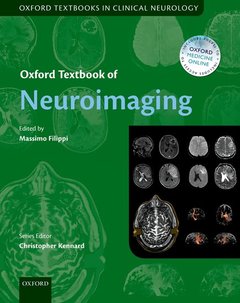Description
Oxford Textbook of Neuroimaging
Oxford Textbooks in Clinical Neurology Series
Coordinator: Filippi Massimo
Language: English
Subject for Oxford Textbook of Neuroimaging:
Publication date: 10-2015
432 p. · 22.4x28.1 cm · Hardback
432 p. · 22.4x28.1 cm · Hardback
Description
/li>Biography
/li>
Part of the Oxford Textbooks in Clinical Neurology series, the Oxford Textbook of Neuroimaging provides an overview of the established and latest neuroimaging methodologies, and illustrates their application to the main diseases of the brain and the spinal cord including movement disorders, headache and stroke. In addition, assessments of neuroimaging techniques in both adult and paediatric neurological conditions are included, enabling thorough examples from both age groups. This full-colour book contains 280 detailed photographs and illustrations that enable a clear understanding of each technique. Covering the newest advances, each different imagining technique is comprehensively described, providing a practical relevance and a stimulus for more in-depth readings. The print edition is supplemented with a concurrent online edition, which allows access to the full content of the textbook, contains links from the references to primary research journal articles, and provides access to figures and tables that can be downloaded by the user. Providing a balanced state-of-the-art guide to neuroimaging for neurologists and radiologists, this title will enhance understanding of the pathophysiological basis of neurological conditions and will help set the stage for future research.
Massimo Filippi is Professor of Neurology at Università Vita-Salute San Raffaele, Milan, Italy. Prof. Filippi is currently Director of the BrainMap Project and Director of the Neuroimaging Research Unit (NRU), Institute of Experimental Neurology, Division of Neuroscience, Scientific Institute and University Ospedale San Raffaele, Milan, Italy. His research activity has always been focused on the use of MR-based technology to improve our understanding of how neurological diseases determine progressive accumulation of irreversible physical disability and cognitive impairment. As Director of the NRU, he coordinated the MRI acquisition and analysis of several large-scale international MRI-monitored trials of MS.
© 2024 LAVOISIER S.A.S.




